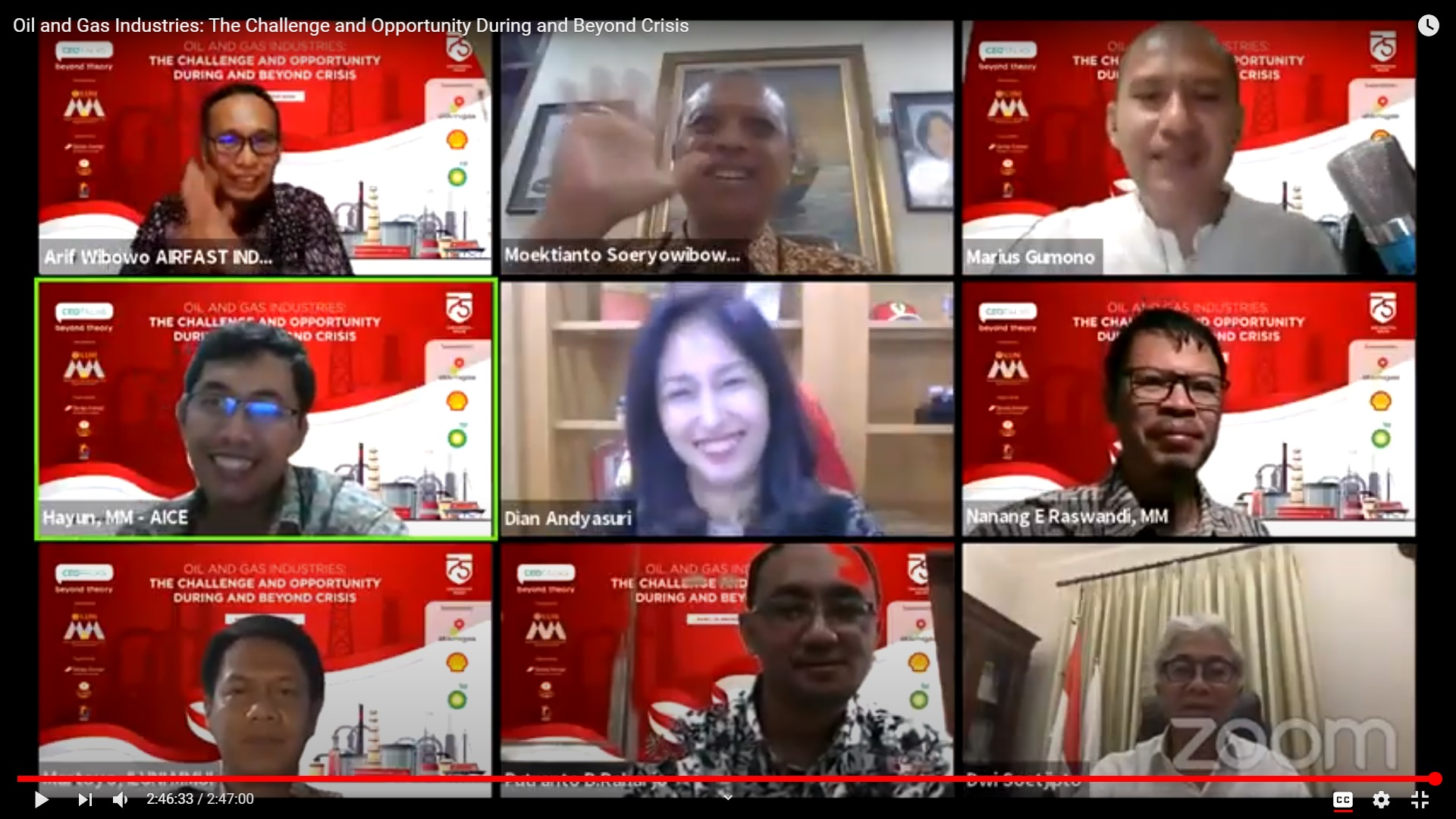ILUNI MM FEB UI, CEO Talks: “Oil and Gas Industries, The Challenge and Opportunity During and Beyond Crisis”
Hana Fajria – Public Relations of FEB UI
Depok – (19/08/2020) ILUNI (Alumni Association) Master (Magister) of Management, Faculty of Economics and Business, Universitas Indonesia, held the 17th CEO Talks based on webinars, on Wednesday (19/8/2020) with the topic “Oil and Gas Industries, The Challenge and Opportunity During and Beyond Crisis.”
Speakers at the CEO talks were Moektianto Soeryowibowo, M.Sc, Head of Country BP Indonesia, Dian Andyasuri, MBA, President Director, Country Chair Shell Indonesia, with Keynote speech by Dr. Dwi Soetjipto, Head of SKK Migas, and moderator Marius Gumono, MM (Energy Observer, MM FEB UI Alumni).
Arief Wibowo, Chairman of MM Iluni opened the webinar, followed by a keynote speech by the Head of SKK Migas, Dwi Soetjipto. The decline in world oil prices has made the Cooperation of Contract Contractors (KKKS) to carry out a strict efficiency regimen, by reducing production costs to ensure that they can continue to operate to maintain national energy security and achieve state revenue targets. This was stated by Dwi Soetjipto explaining the opportunities and challenges of the upstream oil and gas industry. He also explained about the efforts to mitigate the impact of Covid-19 and Low Oil Price through coordination with KKKS and reviewing the 2020 Work plan. Secondly, to conduct a comprehensive assessment of oil price options, to take into account the economics of the marketplace. Third, to re-evaluate the postponement of the Planned Shutdown, and fourth, to coordinate with stakeholders regarding the exclusion of the mobilization of goods and personnel during the Covid-19 Pandemic for the upstream oil and gas industry (The Legal and Human Rights Ministry, Foreign Affairs Ministry, Local Government and Transportation Ministry). Fifth, to submit to MESDM a proposal for giving a stimulus package to KKKS. Sixth, request KKKS to renegotiate contracts in the context of cost efficiency. Seventh, maximize tanks and vessels for temporary storage, and finally try to avoid layoffs in the Upstream Oil and Gas Industry, Dwi said.
As for stimulus efforts in the face of Covid and low oil prices, including postponing ASR cost reserves, tax holidays for income tax in the form of exemption from Branch Profit Tax (BPT) if reinvested in Indonesia, exemption of LNG VAT through the issuance of revised PP 81, for State Owned Goods (BMN) Upstream Oil and Gas are not subject to rental fees, eliminating the cost of using the Badak LNG plant of $ 0.22 / mmbtu, reducing indirect taxes and exempting Import Duty / BM and Taxes in the context of Import / PDRI for Exploitation CAs (PP 27 of 2017 ) and CA After commercial production (Gross Split). Gas can be sold at a discount rate for the volume between TOP and DCQ, with economic considerations, providing incentives (for a certain time limit) such as accelerated depreciation, temporary split changes (e.g. sliding scale), and full price Domestic Market Obligation (DMO). Support from the ministry that fosters upstream oil and gas supporting industries is needed for tax exemptions for businesses supporting upstream oil and gas activities.
To deal with challenges in the current conditions, a Job Creation Bill and an Oil and Gas Bill are required in order to establish legal certainty, data openness, flexibility in the fiscal system, competitive tax and incentives and penalties.
Dian Andyasuri as the first resource person explained Shell’s involvement in the downstream oil and gas industry, in line with the aspirations of the Indonesian Government, to further promote the ‘downstream’ of the energy industry. According to her, access to competitive supplies and sustainable pricing formulas that allow investors to reinvest in the business are prerequisites, while remaining focused on maintaining the safety of customers and employees.
For the downstream oil and gas industry, the energy transition also means helping customers to decarbonize. Preparing for an energy transition will require working with a broad coalition of Governments, industry and others, sector by sector, to identify and enable decarbonization pathways for each sector in Indonesia.
Dian concluded by stating that “Currently, there is an opportunity for closer cooperation between the government and the private sector in Indonesia, solidifying the foundations for a stronger, more competitive and more sustainable economic ecosystem, which will be more resilient and ready to face a pandemic, Industry 4.0 post-Covid19, including in the downstream oil and gas sector” .
Moektianto Soeryowibowo, M.Sc as the second speaker, conveyed the strategy of reducing exploration budgets, increasing efficiency, focusing on production, and selective investment. The desire for clean energy is a strong new challenge for oil & gas. (hjtp)
(am)




